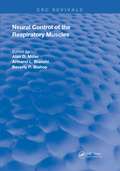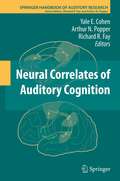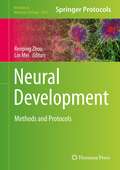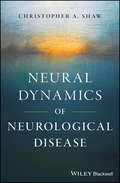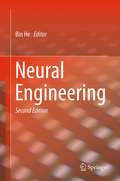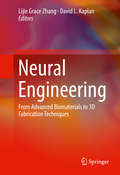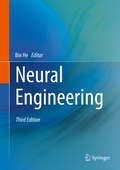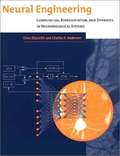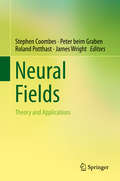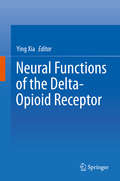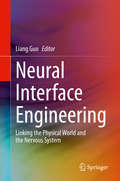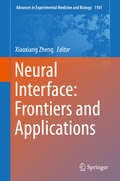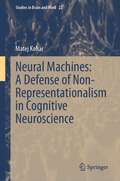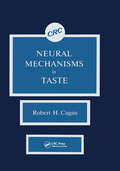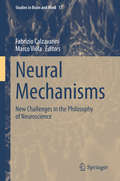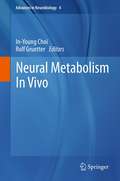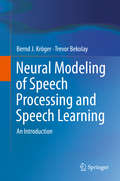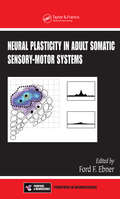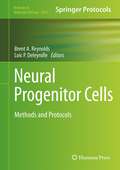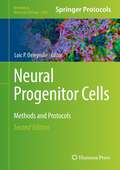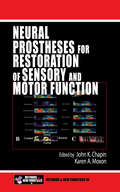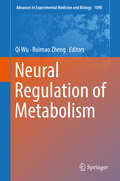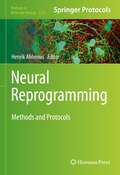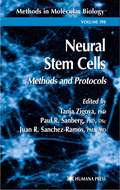- Table View
- List View
Neural Control of the Respiratory Muscles (Routledge Revivals)
by Alan D. Miller Armand L. Bianchi Beverly P. BishopFirst published in 1997. The respiratory muscles are multifunctional muscles involved in other behaviors besides breathing -- from the protection of the upper airway to cognitive functions such as speech or singing. Neural Control of the Respiratory Muscles presents an overall consideration of how these muscles are regulated by the central nervous system in normal as well as in pathological situations.A group of 40 internationally recognized scientists and clinicians have collaborated to discuss current findings in the field and to identify areas of future development such aso The anatomical and functional organization of the respiratory muscles and the mechanics of the chest wallo Respiratory muscle control by the central nervous system during normal breathing and during disease stateso Respiration during sleep, exercise, and locomotiono Respiratory muscle contribution to non-respiratory behaviors; interaction of the central pattern generator for respiration with other central pattern generatorso Multifunctional nature of respiratory muscles and respiratory neurons of the central nervous systemAlthough other texts exist that examine the control of breathing and other specialized topics considered in this volume, Neural Control of the Respiratory Muscles is the first major single-volume publication that takes a broad view of muscle control during non-respiratory behaviors and the coordination of respiration with non-respiratory behaviors.
Neural Correlates of Auditory Cognition
by Arthur N. Popper Richard R. Fay Yale E. CohenHearing and communication present a variety of challenges to the nervous system. To be heard and understood, a communication signal must be transformed from a time-varying acoustic waveform to a perceptual representation to an even more abstract representation that integrates memory stores with semantic/referential information. Finally, this complex, abstract representation must be interpreted to form categorical decisions that guide behavior. Did I hear the stimulus? From where and whom did it come? What does it tell me? How can I use this information to plan an action? All of these issues and questions underlie auditory cognition. Since the early 1990s, there has been a re-birth of studies that test the neural correlates of auditory cognition with a unique emphasis on the use of awake, behaving animals as model. Continuing today, how and where in the brain neural correlates of auditory cognition are formed is an intensive and active area of research. Importantly, our understanding of the role that the cortex plays in hearing has the potential to impact the next generation of cochlear- and brainstem-auditory implants and consequently help those with hearing impairments. Thus, it is timely to produce a volume that brings together this exciting literature on the neural correlates of auditory cognition. This volume compliments and extends many recent SHAR volumes such as Sound Source Localization (2005) Auditory Perception of Sound Sources (2007), and Human Auditory Cortex (2010). For example, in many of these volumes, similar issues are discussed such as auditory-object identification and perception with different emphases: in Auditory Perception of Sound Sources, authors discuss the underlying psychophysics/behavior, whereas in the Human Auditory Cortex, fMRI data are presented. The unique contribution of the proposed volume is that the authors will integrate both of these factors to highlight the neural correlates of cognition/behavior. Moreover, unlike other these other volumes, the neurophysiological data will emphasize the exquisite spatial and temporal resolution of single-neuron [as opposed to more coarse fMRI or MEG data] responses in order to reveal the elegant representations and computations used by the nervous system.
Neural Development
by Lin Mei Renping ZhouUnderstanding the molecular and cellular mechanisms underlying the development of specific neural circuits is not just an intellectual curiosity but also central to our ability to develop therapeutic approaches to repair damaged pathways in the future. In Neural Development: Methods and Protocols, experts in the field contribute commonly used protocols to facilitate future research in developmental neuroscience. Split into four convenient sections, this detailed volume covers techniques of culturing neurons and glia as well as their growth and differentiation, methods of gene delivery and down regulation, protocols for analyzing axon growth and guidance plus synapse formation, and, finally, basic methods to analyze brain morphology and axon pathways in developing animals. Written in the highly successful Methods in Molecular Biology series format, chapters include introductions to their respective topics, lists of the necessary materials and reagents, step-by-step, readily reproducible laboratory protocols, and tips on troubleshooting and avoiding known pitfalls. Comprehensive and accessible, Neural Development: Methods and Protocols provides key guidance for students and postdoctoral fellows new to developmental neurobiology.
Neural Development and Stem Cells
by Melissa Carpenter Mahendra S. Rao Mohan C. VemuriThis expanded and updated edition reflects the enormous increase in our knowledge of the development of the nervous system and the use of neural stem cells in clinical applications. Integrating new information about the use of development of neural stem cells for clinical applications, Drs. Rao, Carpenter and Vemuri have added additional chapters on neural transplantation and development of neural stem cells using reprogramming technologies. A new chapter on cancer in nervous system delineates how the fundamental biology of neural stem cells informs our understanding of cancer and tumor formation in the nervous system. Special attention is paid to the derivation of neural cells from embryonic stem cells and induced pluripotent stem cells. Authoritative and up-to-date, Neural Development and Stem Cells, 3rd Edition provides neuroscientists with a handy guide to stem cells in the nervous system, tracing with great clarity the development of stem cells from differentiation to neurons, astrocytes, and oligodendrocytes.
Neural Dynamics of Neurological Disease
by Christopher A. ShawThe emerging understanding of age-related neurological disorders suggeststhat notions of a single causal gene/toxin being responsible is likely incorrect. Neurological disorders likely arise due to a unique intersection of multiple genetic and toxic factors combined with additional contributions of age, stage of development, immune system actions, and more. This perspective leads to the view that rather than reflecting only one pathway to end state disease, each is a spectrum disorder and each individual case is therefore unique. Neural Dynamics of Neurological Disease argues for a fundamental rethinking of what we think we know about neurological disorders, how these arise and progress and, crucially, what might be done to “cure” them. Chapters first introduce the concept of neural dynamics of neurological disease, then examine various diseases and give examples of the interplay of elements such as neural systems, cell types, and biochemical pathways which can contribute to disease. Concluding chapters point the way forward to how the emerging notion of neurological disease as a dynamic process may lead to more successful treatment options. Providing a cross disciplinary approach to understanding the origin and progression of neurological disease, Neural Dynamics of Neurological Disease is a timely and valuable resource for neuroscientists, researchers and clinicians. About the AuthorChristopher A. Shaw Department of Ophthalmology and Visual Sciences, University of British Columbia, Canada
Neural Engineering
by Bin HeNeural Engineering, 2nd Edition, contains reviews and discussions of contemporary and relevant topics by leading investigators in the field. It is intended to serve as a textbook at the graduate and advanced undergraduate level in a bioengineering curriculum. This principles and applications approach to neural engineering is essential reading for all academics, biomedical engineers, neuroscientists, neurophysiologists, and industry professionals wishing to take advantage of the latest and greatest in this emerging field.
Neural Engineering
by Lijie Grace Grace Zhang David L. L. KaplanThis book covers the principles of advanced 3D fabrication techniques, stem cells and biomaterials for neural engineering. Renowned contributors cover topics such as neural tissue regeneration, peripheral and central nervous system repair, brain-machine interfaces and in vitro nervous system modeling. Within these areas, focus remains on exciting and emerging technologies such as highly developed neuroprostheses and the communication channels between the brain and prostheses, enabling technologies that are beneficial for development of therapeutic interventions, advanced fabrication techniques such as 3D bioprinting, photolithography, microfluidics, and subtractive fabrication, and the engineering of implantable neural grafts. There is a strong focus on stem cells and 3D bioprinting technologies throughout the book, including working with embryonic, fetal, neonatal, and adult stem cells and a variety of sophisticated 3D bioprinting methods for neural engineering applications. There is also a strong focus on biomaterials, including various conductive biomaterials and biomimetic nanomaterials such as carbon-based nanomaterials and engineered 3D nanofibrous scaffolds for neural tissue regeneration. Finally, two chapters on in vitro nervous system models are also included, which cover this topic in the context of studying physiology and pathology of the human nervous system, and for use in drug discovery research. This is an essential book for biomedical engineers, neuroscientists, neurophysiologists, and industry professionals.
Neural Engineering (Bioelectric Engineering Ser.)
by Bin HeThis third edition overviews the essential contemporary topics of neuroengineering, from basic principles to the state-of-the-art, and is written by leading scholars in the field. The book covers neural bioelectrical measurements and sensors, EEG signal processing, brain-computer interfaces, implantable and transcranial neuromodulation, peripheral neural interfacing, neuroimaging, neural modelling, neural circuits and system identification, retinal bioengineering and prosthetics, and neural tissue engineering. Each chapter is followed by homework questions intended for classroom use. This is an ideal textbook for students at the graduate and advanced undergraduate level as well as academics, biomedical engineers, neuroscientists, neurophysiologists, and industry professionals seeking to learn the latest developments in this emerging field.Advance Praise for Neural Engineering, 3rd Edition: “A comprehensive and timely contribution to the ever growing field of neural engineering. Bin He’s edited volume provides chapters that cover both the fundamentals and state-of-the-art developments by the world’s leading neural engineers." Dr. Paul Sajda, Department of Biomedical Engineering, Electrical Engineering and Radiology, Columbia University“Neural Engineering, edited by Prof. He, is an outstanding book for students entering into this fast evolving field as well as experienced researchers. Its didactic and comprehensive style, with each chapter authored by leading scientific authorities, provides the ultimate reference for the field.”Dr. Dario Farina, Department of Bioengineering, Imperial College London, London, UK "Neural Engineering has come of age. Major advances have made possible prosthesis for the blind,mind control for quadraplegics and direct intervention to control seizures in epilepsy patients. Neural Engineering brings together reviews by leading researchers in this flourishing field. Dr. Terrence Sejnowski, Salk Institute for Biolgical Studies and UC San Diego
Neural Engineering: Computation, Representation, and Dynamics in Neurobiological Systems
by Chris Eliasmith Charles H. AndersonFor years, researchers have used the theoretical tools of engineering to understand neural systems, but much of this work has been conducted in relative isolation. In Neural Engineering, Chris Eliasmith and Charles Anderson provide a synthesis of the disparate approaches current in computational neuroscience, incorporating ideas from neural coding, neural computation, physiology, communications theory, control theory, dynamics, and probability theory. This synthesis, they argue, enables novel theoretical and practical insights into the functioning of neural systems. Such insights are pertinent to experimental and computational neuroscientists and to engineers, physicists, and computer scientists interested in how their quantitative tools relate to the brain. The authors present three principles of neural engineering based on the representation of signals by neural ensembles, transformations of these representations through neuronal coupling weights, and the integration of control theory and neural dynamics. Through detailed examples and in-depth discussion, they make the case that these guiding principles constitute a useful theory for generating large-scale models of neurobiological function. A software package written in MatLab for use with their methodology, as well as examples, course notes, exercises, documentation, and other material, are available on the Web.
Neural Fields
by James Wright Stephen Coombes Peter Beim Graben Roland PotthastNeural field theory has a long-standing tradition in the mathematical and computational neurosciences. Beginning almost 50 years ago with seminal work by Griffiths and culminating in the 1970ties with the models of Wilson and Cowan, Nunez and Amari, this important research area experienced a renaissance during the 1990ties by the groups of Ermentrout, Robinson, Bressloff, Wright and Haken. Since then, much progress has been made in both, the development of mathematical and numerical techniques and in physiological refinement und understanding. In contrast to large-scale neural network models described by huge connectivity matrices that are computationally expensive in numerical simulations, neural field models described by connectivity kernels allow for analytical treatment by means of methods from functional analysis. Thus, a number of rigorous results on the existence of bump and wave solutions or on inverse kernel construction problems are nowadays available. Moreover, neural fields provide an important interface for the coupling of neural activity to experimentally observable data, such as the electroencephalogram (EEG) or functional magnetic resonance imaging (fMRI). And finally, neural fields over rather abstract feature spaces, also called dynamic fields, found successful applications in the cognitive sciences and in robotics. Up to now, research results in neural field theory have been disseminated across a number of distinct journals from mathematics, computational neuroscience, biophysics, cognitive science and others. There is no comprehensive collection of results or reviews available yet. With our proposed book Neural Field Theory, we aim at filling this gap in the market. We received consent from some of the leading scientists in the field, who are willing to write contributions for the book, among them are two of the founding-fathers of neural field theory: Shun-ichi Amari and Jack Cowan.
Neural Functions of the Delta-Opioid Receptor
by Ying XiaThis is the first book to summarize the progress of research on the delta opioid receptor (DOR) to date. This receptor, a member of the opioid receptor family, was not studied at all until the 1990s when some researchers began looking into the role that it plays in neuroprotection and other functions. Many scientists from a number of independent labs have now confirmed that DOR can provide neuroprotection from hypoxic/ischemic injuries. They have also found that it plays a role in physiological and pathophysiological events such as hypoxic encephalopathy, epilepsy, acupuncture, Parkinson's disease, etc. by regulating membrane proteins and balancing intracellular survival/death signals. The book will provide a comprehensive overview of the current state of research and provide a blueprint for future directions.
Neural Interface Engineering: Linking the Physical World and the Nervous System
by Liang GuoThis book provides a comprehensive reference to major neural interfacing technologies used to transmit signals between the physical world and the nervous system for repairing, restoring and even augmenting body functions. The authors discuss the classic approaches for neural interfacing, the major challenges encountered, and recent, emerging techniques to mitigate these challenges for better chronic performances. Readers will benefit from this book’s unprecedented scope and depth of coverage on the technology of neural interfaces, the most critical component in any type of neural prostheses.Provides comprehensive coverage of major neural interfacing technologies;Reviews and discusses both classic and latest, emerging topics;Includes classification of technologies to provide an easy grasp of research and trends in the field.
Neural Interface: Frontiers and Applications (Advances in Experimental Medicine and Biology #1101)
by Xiaoxiang ZhengThis book focuses on the frontiers of neural interface technology, including hardware, software, neural decoding and encoding, control systems, and system integration. It also discusses applications for neuroprosthetics, neural diseases and neurorobotics, and the toolkits for basic neuroscience. A neural interface establishes a direct communication channel with the central or peripheral nervous system (CNS or PNS), and enables the nervous system to interact directly with the external devices. Recent advances in neuroscience and engineering are speeding up neural interface technology, paving the way for assisting, augmenting, repairing or restoring sensorimotor and other cognitive functions impaired due to neurological disease or trauma, and so improving the quality of life of those affected. Neural interfaces are now being explored in applications as diverse as rehabilitation, accessibility, gaming, education, recreation, robotics and human enhancement. Neural interfaces also represent a powerful tool to address fundamental questions in neuroscience. Recent decades have witnessed tremendous advances in the field, with a huge impact not only in the development of neuroprosthetics, but also in our basic understanding of brain function. Neural interface technology can be seen as a bridge across the traditional engineering and basic neuroscience. This book provides researchers, graduate and upper undergraduate students from a wide range of disciplines with a cutting-edge and comprehensive summary of neural interface engineering research.
Neural Machines: A Defense of Non-Representationalism in Cognitive Neuroscience (Studies in Brain and Mind #22)
by Matej KohárIn this book, Matej Kohar demonstrates how the new mechanistic account of explanation can be used to support a non-representationalist view of explanations in cognitive neuroscience, and therefore can bring new conceptual tools to the non-representationalist arsenal. Kohar focuses on the explanatory relevance of representational content in constitutive mechanistic explanations typical in cognitive neuroscience. The work significantly contributes to two areas of literature: 1) the debate between representationalism and non-representationalism, and 2) the literature on mechanistic explanation.Kohar begins with an introduction to the mechanistic theory of explanation, focusing on the analysis of mechanistic constitution as the basis of explanatory relevance in constitutive mechanistic explanation. He argues that any viable analysis of representational contents implies that content is not constitutively relevant to cognitive phenomena. The author also addresses objections against his argument and concludes with an examination of the consequences of his account for both traditional cognitive neuroscience and non-representationalist alternatives. This book is of interest to readers in philosophy of mind, cognitive science and neuroscience.
Neural Mechanisms in Taste
by Robert H. CaganThe purpose of NEURAL MECHANISM in TASTE is to emphasize physiological principles and reveal new insights of this most recent research. This book is aimed to reach scientists within the broad area of neurophysiology as well as those in other disciplines who have interests in sensory mechanisms. The focus is on two major themes--peripheral mechanisms and neural processing at the central level. Every chapter is written by an expert on the subject matter, including definitive updates on the status of each topic. This work is not only useful to researchers in taste, but also to basic and applied scientists in related fields (such as food technology), doctoral and postdoctoral students.
Neural Mechanisms: New Challenges in the Philosophy of Neuroscience (Studies in Brain and Mind #17)
by Fabrizio Calzavarini Marco ViolaThis volume brings together new papers advancing contemporary debates in foundational, conceptual, and methodological issues in cognitive neuroscience. The different perspectives presented in each chapter have previously been discussed between the authors, as the volume builds on the experience of Neural Mechanisms (NM) Online – webinar series on the philosophy of neuroscience organized by the editors of this volume. The contributed chapters pertain to five core areas in current philosophy of neuroscience. It surveys the novel forms of explanation (and prediction) developed in cognitive neuroscience, and looks at new concepts, methods and techniques used in the field. The book also highlights the metaphysical challenges raised by recent neuroscience and demonstrates the relation between neuroscience and mechanistic philosophy. Finally, the book dives into the issue of neural computations and representations. Assembling contributions from leading philosophers of neuroscience, this work draws upon the expertise of both established scholars and promising early career researchers.
Neural Metabolism In Vivo
by Rolf Gruetter In-Young ChoiFrom the preface: "Neural Metabolism In Vivo aims to provide a comprehensive overview of neurobiology by presenting the basic principles of up-to-date and cutting-edge technology, as well as their application in assessing the functional, morphological and metabolic aspects of the brain. Investigation of neural activity of the living brain via neurovascular coupling using multimodal imaging techniques extended our understanding of fundamental neurophysiological mechanisms, regulation of cerebral blood flow in connection to neural activity and the interplay between neurons, astrocytes and blood vessels. Constant delivery of glucose and oxygen for energy metabolism is vital for brain function, and the physiological basis of neural activity can be assessed through measurements of cerebral blood flow and consumption of glucose and oxygen.... This book presents the complex physiological and neurochemical processes of neural metabolism and function in response to various physiological conditions and pharmacological stimulations. Neurochemical detection technologies and quantitative aspects of monitoring cerebral energy substrates and other metabolites in the living brain are described under the "Cerebral metabolism of antioxidants, osmolytes and others in vivo" section. Altogether, the advent of new in vivo tools has transformed neuroscience and neurobiology research, and demands interdisciplinary approaches as each technology could only approximate a very small fraction of the true complexity of the underlying biological processes. However, translational values of the emerging in vivo methods to the application of preclinical to clinical studies cannot be emphasized enough. Thus, it is our hope that advances in our understanding of biochemical, molecular, functional and physiological processes of the brain could eventually help people with neurological problems, which are still dominated by the unknowns." -- In-Young Choi and Rolf Gruetter
Neural Modeling of Speech Processing and Speech Learning: An Introduction
by Bernd J. Kröger Trevor BekolayThis book explores the processes of spoken language production and perception from a neurobiological perspective. After presenting the basics of speech processing and speech acquisition, a neurobiologically-inspired and computer-implemented neural model is described, which simulates the neural processes of speech processing and speech acquisition. This book is an introduction to the field and aimed at students and scientists in neuroscience, computer science, medicine, psychology and linguistics.
Neural Plasticity in Adult Somatic Sensory-Motor Systems (Frontiers in Neuroscience)
by Ford F EbnerSynthesizing current information about sensory-motor plasticity, Neural Plasticity in Adult Somatic Sensory-Motor Systems provides an up-to-date description of the dynamic processes that occur in somatic sensory-motor cortical circuits or somatic sensory pathways to the cortex due to experience, learning, or damage to the nervous system. The book e
Neural Progenitor Cells: Methods and Protocols
by Loic P. Deleyrolle Brent A. ReynoldsThe discovery of stem and progenitor cells in the adult mammalian CNS challenged the long standing "no new neuron" doctrine and opened the door to the potential for cell replacement therapy. The process from discovery to clinical applications can be long and tortuous, requiring rigorous steps involving standardized and precise protocols. Neural Progenitor Cells: Methods and Protocols is a collection of practical articles describing techniques used to study neural stem and progenitor cells. The volume also highlights the promise of stem cell-based therapeutic applications for CNS disorders. Written in the successful Methods in Molecular Biology series format, chapters include introductions to their respective topics, lists of the necessary materials and reagents, step-by-step, readily reproducible protocols, and notes on troubleshooting and avoiding known pitfalls. Authoritative and easily accessible, Neural Progenitor Cells: Methods and Protocols serves both professionals and novices with its well-honed methodologies.
Neural Progenitor Cells: Methods and Protocols (Methods in Molecular Biology #2389)
by Loic P. DeleyrolleThis updated edition collects cutting-edge techniques used to study neural stem and progenitor cells as well as the brain microenvironment. Featuring a wide range of technological advances in the study of neural stem cells, the volume highlights the promises of stem cell-based therapeutic applications for central nervous system ailments. Written for the highly successful Methods in Molecular Biology series, chapters include introductions to their respective topics, lists of the necessary materials and reagents, step-by-step, readily reproducible laboratory protocols, and tips on troubleshooting and avoiding known pitfalls. Authoritative and practical, Neural Progenitor Cells: Methods and Protocols, Second Edition serves as an invaluable resource for the next generation of neuroscientists as they develop innovative experimental paradigms and progress toward therapeutic applications in the field of neurobiology.
Neural Prostheses for Restoration of Sensory and Motor Function
by John K. Chapin Karen A. MoxonThe prospect of interfacing the nervous system with electronic devices to stimulate or record from neural tissue suggests numerous possibilities in the field of neuroprosthetics. While the creation of a "six million dollar man" may still be far into the future, neural prostheses are rapidly becoming viable theories for a broad range of patients wit
Neural Regulation of Metabolism (Advances in Experimental Medicine and Biology #1090)
by Qi Wu Ruimao ZhengThis book systemically describes the mechanisms underlying the neural regulation of metabolism. Metabolic diseases, including obesity and its associated conditions, currently affect more than 500 million people worldwide. Recent research has shown that the neural regulation of metabolism is a central mechanism that controls metabolic status physiologically and pathophysiologically. The book first introduces the latest studies on the neural and cellular mechanisms of hypothalamic neurons, hypothalamic glial cells, neural circuitries, cellular signaling pathways, and synaptic plasticity in the control of appetite, body weight, feeding-related behaviors and metabolic disorders. It then summarizes the humoral mechanisms by which critical adipocyte-derived hormones and lipoprotein lipase regulate lipid and glucose metabolism, and examines the role of the hypothalamus-sympathetic nerve, a critical nerve pathway from CNS to peripheral nervous system (PNS), in the regulation of metabolism in multiple tissues/organs. Furthermore, the book discusses the functions of adipose tissue in energy metabolism. Lastly, it explores dietary interventions to treat neural diseases and some of the emerging technologies used to study the neural regulation of metabolism. Presenting cutting-edge developments in the neural regulation of metabolism, the book is a valuable reference resource for graduate students and researchers in the field of neuroscience and metabolism.
Neural Reprogramming: Methods and Protocols (Methods in Molecular Biology #2352)
by Henrik AhleniusThis detailed book brings together a number of state-of-the-art protocols to generate different types of neural cells through the use of reprogramming technologies. Additionally, the volume explores different aspects of functional evaluation and applications of reprogrammed neural cells as well as in silico methods to aid reprogramming efforts. Written for the highly successful Methods in Molecular Biology series, chapters include introductions to their respective topics, lists of the necessary materials and reagents, step-by-step, readily reproducible laboratory protocols, and tips on troubleshooting and avoiding known pitfalls. Authoritative and cutting-edge, Neural Reprogramming: Methods and Protocols provides ample experimental experience and guidance for anyone, be it experienced researcher or beginner, to generate, validate, and apply reprogrammed neural cells in their research.
Neural Stem Cells
by Tanja Zigova Juan R. Sanchez-Ramos Paul R. SanbergIn Neural Stem Cells: Methods and Protocols, internationally recognized experts from academic, clinical, and pharmaceutical laboratories describe in great detail the most frequently used cellular, molecular, and electrophysiological methods to isolate, characterize, and utilize neural stem cells. These readily reproducible techniques introduce the various sources of stem/progenitor cells, provide a wide range of conditions for their culture, and make it possible to define their properties in culture. Additional techniques are designed to help researchers identify endogenous stem cells as well as exogenous stem cells after transplantation in the brain. The protocols range from the simplest methods of isolation and characterization of neural cell properties to such very sophisticated methods as characterizing gene expression, telomerase assays, and cell cycle kinetics.
